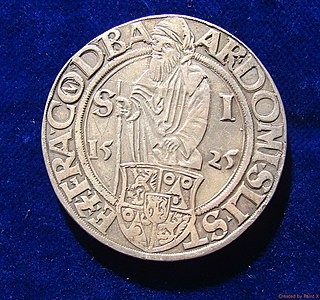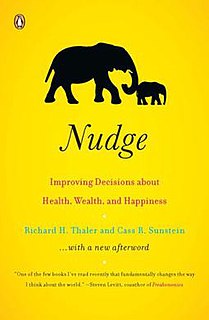
The thaler was a silver coin used throughout Europe for almost four hundred years. Its name lives on in the many currencies called dollar and the Samoan tālā, and, until 2007, also in the Slovenian tolar.

Elf was an American rock band founded in 1967 by singer and bassist Ronnie James Dio, keyboardist Doug Thaler, drummer Gary Driscoll, and guitarists Nick Pantas and David Feinstein. The band was originally called the Electric Elves, but was shortened to the Elves in 1968 and finally Elf in 1972. Elf disbanded in 1975 after recording three albums and after most of the lineup had been absorbed into Ritchie Blackmore's new group, Ritchie Blackmore's Rainbow.

The Maria Theresa thaler (MTT) is a silver bullion coin and a type of Conventionsthaler that has been used in world trade continuously since it was first minted in 1741. It is named after Empress Maria Theresa, who ruled Austria, Hungary, and Bohemia from 1740 to 1780 and is depicted on the coin.

The birr is the unit of currency in Ethiopia. Before 1976, dollar was the official English translation of birr. Today, it is officially birr in English as well.

Richard H. Thaler is an American economist and the Charles R. Walgreen Distinguished Service Professor of Behavioral Science and Economics at the University of Chicago Booth School of Business. In 2015, Thaler was president of the American Economic Association.
The Conventionsthaler was a standard silver coin of the Holy Roman Empire. It was introduced in 1754 and contained one tenth of a Cologne mark of silver or about 23.39 grams. Its most famous example is the Maria Theresa thaler which is minted until today.
The Reichsthaler was a standard Thaler silver coin of the Holy Roman Empire, established in 1566 by the Leipzig convention. This original Reichsthaler specie was supplemented in the 16th century by various Reichsthaler units of account in northern Germany in the 17th century and by a Prussian Reichsthaler coin in 1750.

Tolar is the Czech name for the silver coin mined in Kingdom of Bohemia in the 16th century in Jáchymov. The modern word dollar was derived from the Spanish dollar, so-called in the English-speaking world because they were of similar size and weight to the German Thalers. The German Thalers were so named because they were first minted from a silver mine in 1520 in Joachimsthal. It was the main currency in Bohemia from 1520 to 1750.
The Thaler was the currency of the Free Hanseatic City of Bremen until 1873. It was divided into 72 Grote, each of 5 Schwaren.
The lira AOI was a special banknote circulating in Italian East Africa between 1938 and 1941.
The Thaler was the currency of Prussia until 1857. From 1750, it was distinct from north German Reichsthaler unit of account in that it contained 1⁄14 of a Cologne mark of silver, rather than 1⁄12, and was minted as a coin. This change was implemented by Johann Philipp Graumann and the system of 14 thaler to the mark was known as the Graumannscher Fuß.
The Thaler was the currency of the Landgravate, then Electorate of Hesse-Kassel until 1858. Until 1807, the Thaler was subdivided into 32 Albus, each of 12 Heller. It was worth three quarters of a Conventionsthaler.
The Thaler was a coin issued by Baden at various times. Before 1821, Baden issued Kronenthaler and Conventionsthaler.
Libertarian paternalism is the idea that it is both possible and legitimate for private and public institutions to affect behavior while also respecting freedom of choice, as well as the implementation of that idea. The term was coined by behavioral economist Richard Thaler and legal scholar Cass Sunstein in a 2003 article in the American Economic Review. The authors further elaborated upon their ideas in a more in-depth article published in the University of Chicago Law Review that same year. They propose that libertarian paternalism is paternalism in the sense that "it tries to influence choices in a way that will make choosers better off, as judged by themselves" ; note and consider, the concept paternalism specifically requires a restriction of choice. It is libertarian in the sense that it aims to ensure that "people should be free to opt out of specified arrangements if they choose to do so". The possibility to opt-out is said to "preserve freedom of choice". Thaler and Sunstein published Nudge, a book-length defense of this political doctrine, in 2008.

Amaurobius is a genus of tangled nest spiders that was first described by Carl Ludwig Koch in 1837.

Klaus-Peter Thaler was a professional cyclist between 1976 and 1988, successful in road-racing and cyclo-cross. He was world cyclo-cross champion twice as amateur and twice as professional and German champion eight times.

The Basel Thaler was the currency of the Swiss Canton of Basel until 1798. The currency was issued by both the Canton and the Bishopric of Basel.
The thaler was the currency of the Geneva until 1798 and between 1813 and 1839. It was subdivided into 12¾ florins, each of 12 sols, with the sol divided into 12 deniers.

Nudge: Improving Decisions about Health, Wealth, and Happiness is a book written by University of Chicago economist Richard H. Thaler and Harvard Law School Professor Cass R. Sunstein, first published in 2008.
This page is based on this
Wikipedia article Text is available under the
CC BY-SA 4.0 license; additional terms may apply.
Images, videos and audio are available under their respective licenses.








